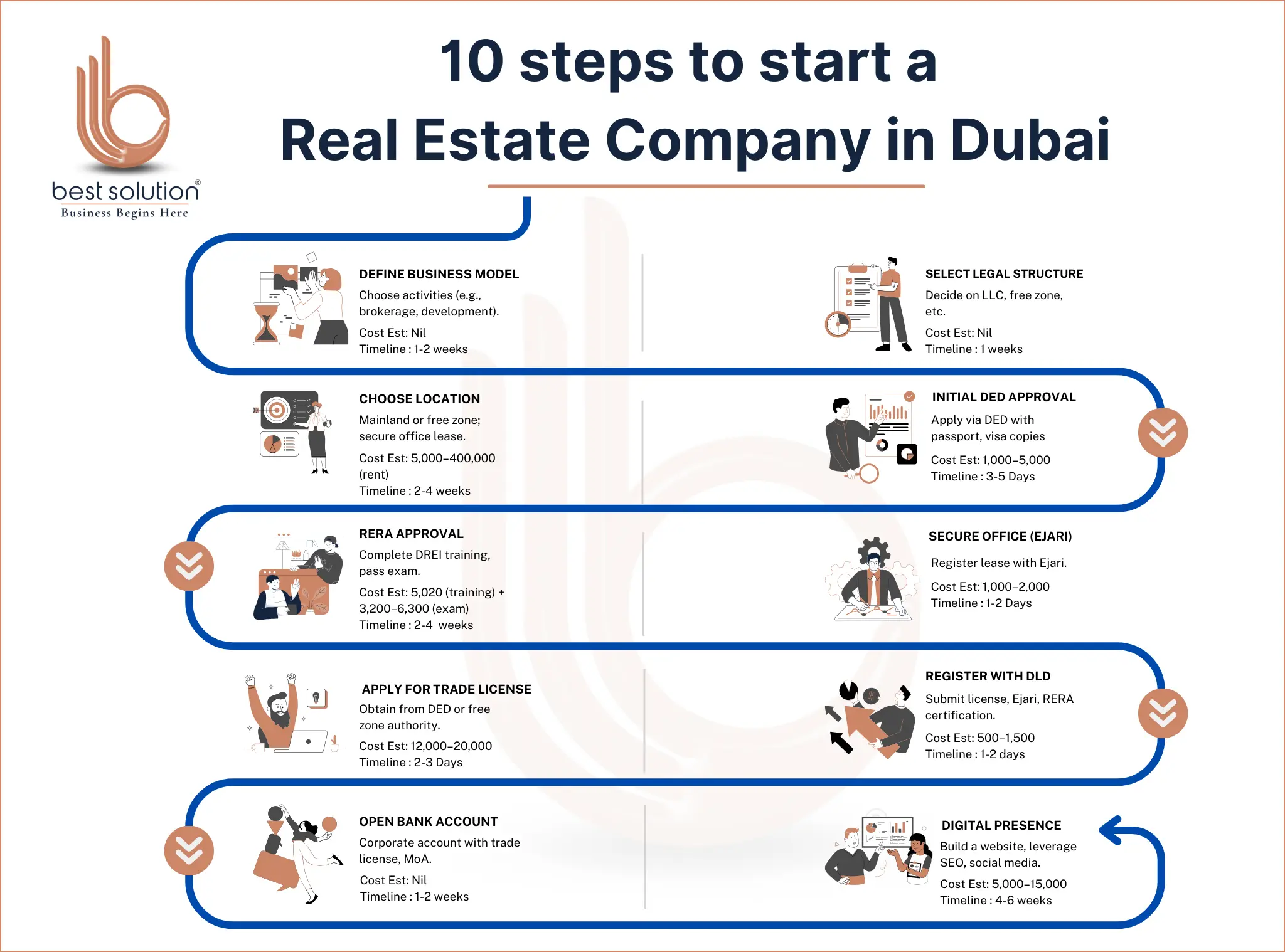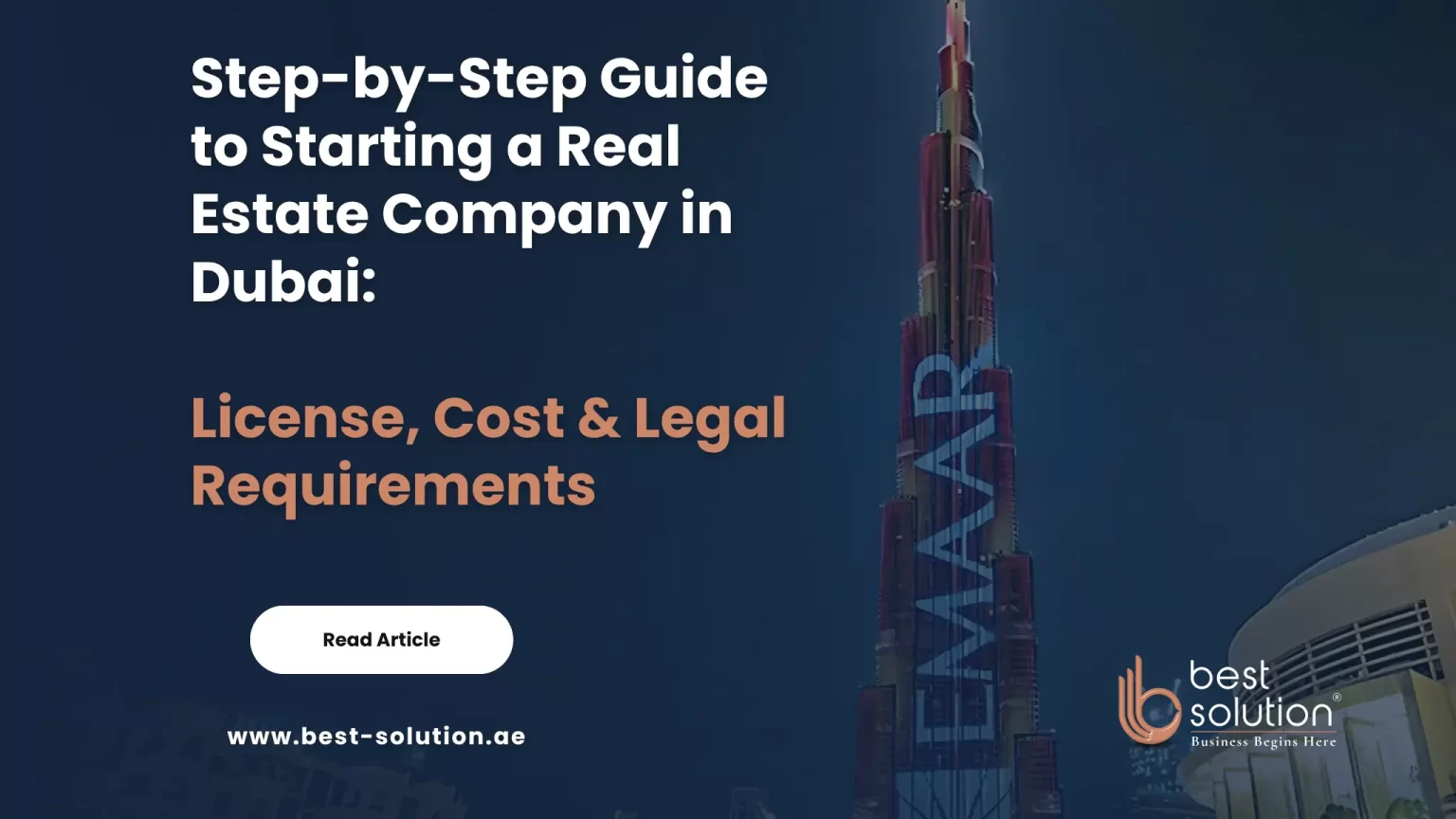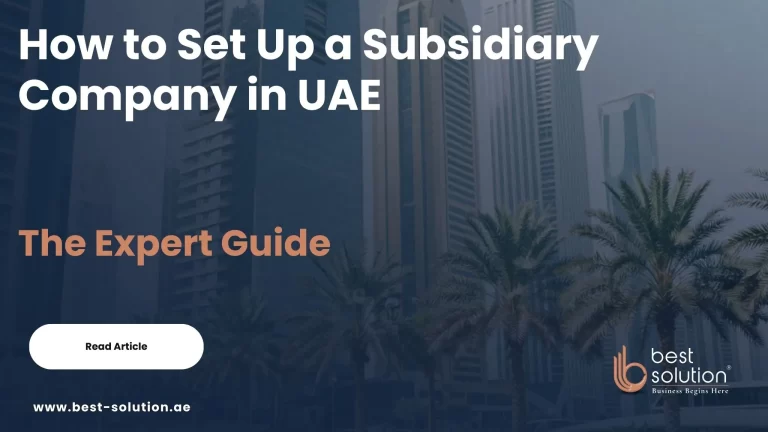Introduction: Why Dubai’s Real Estate Market Beckons Entrepreneurs
Why Start a Real Estate Company in Dubai?
Market Strengths:
- Tax Advantages: No personal income tax and a low 9% corporate tax on profits above AED 375,000.
- Strategic Location: A gateway between East and West, attracting global investors.
- Government Support: Policies like 100% foreign ownership and Golden Visas boost investor confidence.
Diverse Opportunities: From luxury villas to commercial spaces, the market caters to varied niches.
Potential Challenges: Global economic factors, such as trade tariffs, may impact growth, as noted in a recent Bloomberg report. However, Dubai’s resilient economy and proactive policies mitigate these risks.
What Type of Real Estate Business Should You Start?
Before diving in, decide which real estate activity suits your expertise and market demand. Options include:
- Brokerage: Facilitating property sales or rentals, requiring a RERA license.
- Development: Building residential or commercial projects, ideal for those with construction expertise.
- Property Management: Overseeing properties for owners, focusing on maintenance and tenant relations.
- Consultancy: Offering market insights and investment advice.
- Marketing: Promoting properties through digital or traditional channels.
Choosing the Right Fit: Brokerage is popular for its lower entry barriers, while development suits those with significant capital. For example, Emaar Properties started with development and grew into a global giant with projects like Burj Khalifa. Assess your skills and market trends—luxury properties are in demand, but affordable housing is gaining traction.
The most common real estate business in Dubai is brokerage, which involves buying, selling, or renting properties. It requires a RERA license, costing around AED 5,020 for training and AED 12,900 for the license, and offers commissions of 2-5% per transaction.
Who Can Start a Real Estate Company in Dubai?
Dubai welcomes both local and foreign entrepreneurs. Key eligibility criteria include:
The most common real estate business in Dubai is brokerage, which involves buying, selling, or renting properties. It requires a RERA license, costing around AED 5,020 for training and AED 12,900 for the license, and offers commissions of 2-5% per transaction.
- Age: Must be 21 or older; those under 21 need guardian consent and authority approval (Property Finder).
- Qualifications: No specific degree is required, but RERA training is mandatory for brokerage.
- Ownership: 100% foreign ownership is allowed in free zones, while mainland setups may require a local sponsor for certain activities.
Legal Structures:
| Structure | Description | Pros | Cons |
| LLC (Mainland) | Limited Liability Company for local and global operations. | Full market access, flexibility. | May require a local sponsor. |
| Free Zone Company | 100% foreign ownership, tax exemptions. | No sponsor needed, streamlined setup. | Limited to free zone or international operations. |
| Branch of Foreign Company | Extension of an existing foreign business. | Leverages parent company’s reputation. | Complex compliance requirements. |
| Civil Company | For professional services like consultancy. | Simple setup, lower costs. | Limited to specific activities. |
Where to Set Up Your Business?
Choosing the right location is critical. Options include:
- Mainland: Offers access to Dubai’s local market, ideal for brokerage or management. Popular areas include Business Bay, known for its commercial vibrancy.
- Free Zones: Such as Dubai Multi Commodities Centre (DMCC) or Meydan Free Zone, which offer tax benefits like 0% personal income tax and 100% foreign ownership, but restrict local operations. Meydan Free Zone, located near downtown Dubai, provides a strategic hub with business incentives for real estate companies.
- Office Location: Select a client-friendly area like Sheikh Zayed Road for visibility. Office rent ranges from AED 80,000 to AED 400,000 annually.
Imagine setting up in Business Bay, where modern towers house thriving businesses. Your office overlooks the Burj Al Arab, signalling prestige to clients. Register your lease with Ejari to comply with regulations.
Setting up in Dubai’s mainland allows real estate companies to serve local clients, while free zones like DMCC offer tax exemptions. Office rent in Business Bay averages AED 150,000 annually, requiring an Ejari-registered lease.
When to Start Your Real Estate Company?
Timing matters in Dubai’s cyclical real estate market. Key considerations:
- Market Trends: 2025 is promising, with 41,000 new units expected, but oversupply may stabilise prices.
- Seasonal Factors: Spring and autumn see higher transaction volumes due to favourable weather and investor activity.
- Regulatory Updates: Stay informed about changes, like the Smart Rental Index by DLD, enhancing market transparency.
How to Start: Step-by-Step Process

Here’s a detailed roadmap to launch your real estate company, with estimated costs and timelines:
| Step | Description | Cost (AED) | Timeline |
| 1. Define Business Model | Choose activities (e.g., brokerage, development). | - | 1-2 weeks |
| 2. Select Legal Structure | Decide on LLC, free zone, etc. | - | 1 week |
| 3. Choose Location | Mainland or free zone; secure office lease. | 5,000–400,000 (rent) | 2-4 weeks |
| 4. Initial DED Approval | Apply via DED with passport, visa copies. | 1,000–5,000 | 3-5 days |
| 5. RERA Approval | Complete DREI training, pass exam. | 5,020 (training) + 3,200–6,300 (exam) | 2-4 weeks |
| 6. Secure Office (Ejari) | Register lease with Ejari. | 1,000–2,000 | 1-2 days |
| 7. Apply for Trade License | Obtain from DED or free zone authority. | 12,000–20,000 | 2-3 days |
| 8. Register with DLD | Submit license, Ejari, RERA certification. | 500–1,500 | 1-2 days |
| 9. Open Bank Account | Corporate account with trade license, MoA. | - | 1-2 weeks |
| 10. Digital Presence | Build a website, leverage SEO, social media. | 5,000–15,000 | 4-6 weeks |
Legal and Compliance Requirements
Compliance is non-negotiable in Dubai’s regulated market. Key requirements include:
Licenses:
- Trade License: Issued by DED, costs AED 12,000–20,000 annually.
- Real Estate Brokerage License: From DLD, costs AED 12,900.
- RERA Certification: Mandatory for brokers, renewed annually.
- RERA Regulations: Include trust accounts, marketing approvals, and anti-money laundering (AML) compliance.
- Insurance: Professional indemnity, office, and workers’ compensation are required.
- Taxes: 5% VAT on commercial properties, 4% property transfer fee, and 9% corporate tax on profits above AED 375,000. Companies must register with the Federal Tax Authority (FTA) to comply with VAT and corporate tax regulations, ensuring proper tax management and reporting (FTA).
- Ethical Standards: Adhere to AML laws and maintain transparency. Non-compliance can lead to fines or license revocation. Best Solution Business Setup ensures compliance through expert guidance.
Financial Considerations
Starting a real estate company requires significant investment. Here’s a breakdown:
Funding Options:
- Self-Funding: Common for small brokerages.
- Bank Loans: Available from UAE banks with a trade license and a business plan.
- Investors: Angel investors or venture capital for larger ventures.
- Government Programs: Explore initiatives via DED.
Building Your Team
A skilled team is your backbone. Key roles include:
- RERA-Certified Brokers: Must complete DREI training and pass exams.
- Operations Manager: Oversees daily activities.
- Marketing Specialist: Drives digital and traditional campaigns.
- Accountant: Manages finances and tax compliance.
Hiring Tips:
- Recruit via platforms like linkedin for experienced agents.
- Ensure staff comply with visa regulations by obtaining necessary work visas through the General Directorate of Residency and Foreigners Affairs (GDRFA), which manages residency and visa processes in Dubai (GDRFA).
- Adhere to labor laws and regulations set by the Ministry of Human Resources and Emiratisation (MOHRE) to ensure proper employment practices and compliance (MOHRE).
- Foster cultural diversity to serve clients from Emirati, Western, and Asian backgrounds.
Example: Fajar Realty’s success stems from its diverse team, led by Ms. Kiran with 17+ years of experience
Marketing and Growth Strategies
Stand out in Dubai’s competitive market with these strategies:
- Digital Marketing: Invest in SEO for terms like “open real estate company Dubai” and list properties on Bayut. Social media campaigns on Instagram and LinkedIn target high-net-worth clients.
- Networking: Attend events like Cityscape Dubai to build referral networks.
- Technology: Use CRM systems (AED 1,000–5,000/year) for client management and virtual tours for property showcases.
- Premium Branding: Position your company as a luxury brand, like DAMAC Properties, known for high-end developments (DAMAC Properties).
Cultural and Ethical Considerations
Dubai’s diverse clientele requires cultural competence:
- Understand Local Norms: Respect Emirati traditions, such as Ramadan business hours.
- Build Relationships: Personal connections are key in the UAE market.
- Ethical Practices: Comply with AML laws and maintain transparency to build trust.
“Success in Dubai’s real estate market comes from understanding its people and adhering to ethical standards,” says Mr. Essa Al Harthi, CEO of Best Solution Business Setup.
Success Stories: Learning from the Best
- Emaar Properties: Founded in 1997, Emaar transformed Dubai’s skyline with Burj Khalifa and The Dubai Mall. Their focus on mixed-use developments set a global benchmark.
- Nick Vadera: At 23, this agent sold AED 150 million in properties by leveraging digital platforms and client trust, proving that dedication pays off.
Conclusion: Your Path to Real Estate Success in Dubai
Starting a real estate company in Dubai is a rewarding venture, offering access to a thriving market with unparalleled opportunities. By following this guide—defining your business model, securing licenses, building a team, and leveraging marketing—you’re well-equipped to succeed. Partner with Best Solution Business Setup to navigate the process with ease, ensuring compliance and efficiency.
Key Takeaways:
- Dubai’s market is booming, with 5-7% growth expected in 2025.
- Startup costs range from AED 300,000 to AED 1 million.
- Compliance with RERA and DLD is essential.
- Digital marketing and cultural competence drive success.
Ready to launch your real estate empire? Contact Best Solution Business Setup for a free consultation. Share your thoughts in the comments or connect with us on social media to join the conversation!
What is Ejari, and why do I need it?
Ejari is a system to register rental agreements with the Dubai Land Department. You need it to legalize your office lease, which is a requirement for obtaining a trade license and operating your business legally.
What does RERA do, and do I need to deal with them?
RERA regulates Dubai’s real estate market, issues broker licenses, and ensures compliance. If you plan to offer brokerage services, you must get RERA certification by completing their training and passing an exam.
How do I get a trade license from the DED?
To get a trade license from the DED:
- Choose your business activity (e.g., real estate brokerage).
- Submit an application with your company name, lease agreement (Ejari), and other documents.
- Pay the required fees (around AED 12,000–20,000 annually). The process takes a few days once all paperwork is complete.
How much does it cost to start a real estate company in Dubai?
Costs vary by setup:
- Trade license: AED 12,000–20,000.
- Office rent: AED 80,000–400,000 per year.
- RERA certification: AED 5,000–15,000.
- Initial capital: AED 50,000–1 million, depending on your business model.
Can foreigners own a real estate company in Dubai?
Yes. In free zones, foreigners can own 100% of the company. On the mainland, you may need a local sponsor for 51% ownership, though fee-based agreements can limit their role. Recent laws also allow full foreign ownership for some activities.
How long does it take to set up a real estate company?
It typically takes 4–6 weeks, including trade license approval (3–5 days), RERA training (2–4 weeks), and DLD registration (1–2 days). Delays can happen if documents are missing.
Why is Dubai good for the real estate business?
Dubai’s real estate market thrives due to its tax-free environment, strategic location, and strong government support, with 226,000 transactions in 2024 and a projected 5-7% growth in 2025.
Can foreigners start a real estate company in Dubai?
Yes, foreigners can start a real estate company in Dubai with 100% ownership in free zones or through an LLC on the mainland, requiring a trade license and RERA certification.
What licenses are needed for a real estate company in Dubai?
You need a trade license from DED (AED 12,000–20,000), a real estate brokerage license from DLD (AED 12,900), and RERA certification (AED 5,020) after completing DREI training.
Disclaimer : This guide provides a general information . Regulations and costs may change time to time based on government rules, so consult the best solution’s professional Business Setup consultants for the latest updates. Refer to the glossary for definitions of key terms which is mentioned in this article. Refer to the glossary for definitions of key terms. Refer to the glossary for definitions of key terms.









